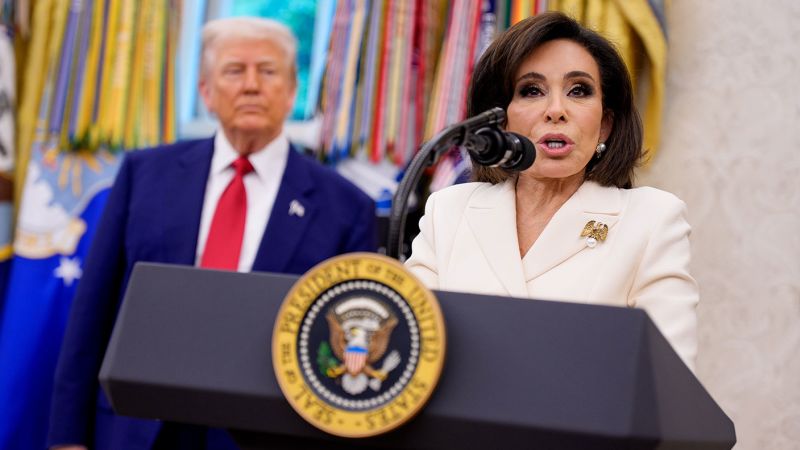In a notable political move, President Donald Trump has nominated Jeanine Pirro, a former host at Fox News and interim US Attorney, for a full term as the chief federal prosecutor in Washington, D.C. This announcement was made through a White House news release, emphasizing the administration’s continued backing of Pirro for this important position in the justice system. Her four-year term nomination has already been forwarded to the Senate for consideration, setting the stage for a vote that could influence the future of law enforcement in the nation’s capital.
Pirro’s journey to this nomination has been marked by rapid changes. Last month, she was appointed to the role on an interim basis after the President’s first choice, Ed Martin, encountered significant resistance from Republican members of Congress. This pushback made it evident that Martin’s candidacy faced hurdles that could jeopardize his confirmation. In what could be interpreted as a strategic recalibration, Trump turned to Pirro, a longtime ally and supporter, to fill the role.
With a robust background, Pirro is not a novice to the realms of law and politics. She has previously served as a judge and was a district attorney for Westchester County in New York. However, after leaving her position in the district attorney’s office in 2005, she transitioned into a career in television that brought her significant notoriety but sidelined her legal career. The path from media personality back to a key prosecutorial function presents its own dilemmas, particularly in the highly polarized climate of contemporary American politics.
The public perception of Pirro has been shaped significantly by her media appearances and the content of her commentary. CNN’s KFile conducted a review and uncovered a pattern in her radio shows, wherein she has repeatedly called for investigations into Trump’s political adversaries. This includes federal prosecutors, judges, and local officials involved in legal proceedings against Trump himself. Such proclamations raise serious questions about her impartiality and ability to oversee federal prosecutions fairly, underscoring potential conflicts of interest that could arise from her close ties to the former president.
Furthermore, Pirro has been a vocal critic of federal law enforcement and the judicial system. Notably, she has espoused divisive narratives around key events, including downplaying the violence during the January 6 Capitol riots. Her rhetoric categorized the events as a politicized “narrative” while advocating for investigations against law enforcement officials—a stance that has drawn criticism from various quarters. Moreover, her claims that the 2020 presidential election was “stolen” have been a point of contention, placing her in the crosshairs of numerous accusations regarding the distribution of misinformation. Her involvement in the defamation lawsuit against Fox News, which resulted in a historic settlement amounting to over $787 million, further highlights the controversies that surround her narrative practices.
The Senate confirmation process will require Pirro to undergo a thorough vetting, including providing a comprehensive disclosure of all her media engagements—recorded over numerous years of public commentary through television and radio. This process was significant in the downfall of Martin’s nomination. He was compelled to withdraw when he failed to disclose a vast number of his media appearances, which inadvertently undermined his candidacy. The scrutiny Pirro faces will no doubt be intense, as her history of public statements raises questions about her competency as a neutral prosecutor.
As this political saga unfolds and as Pirro prepares for her Senate confirmation hearing, it presents a defining moment for the Trump administration, her career, and the entire justice system in America. Key contributions from CNN reporters Hannah Rabinowitz, Andrew Kaczynski, and Em Steck have added a depth of understanding to the broader implications of this nomination. Ultimately, the nomination of Jeanine Pirro could have far-reaching consequences that transcend individual politics, influencing public trust and the operational integrity of the law in the nation’s capital.



